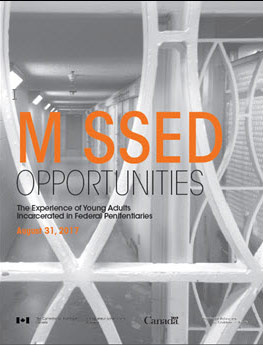From: cbc.ca
Canada's prison watchdog and Ontario's Child Advocate say Correctional Service Canada is squandering opportunities to turn young federal inmates' lives around.
"The majority of them are not enrolled in programs or school, not because they're not motivated but because they're wait-listed and there are very few programs being offered," said Canada's Correctional Investigator Ivan Zinger in an interview with CBC News. "They're also not connecting with the programs."
Zinger said Correctional Services Canada has designed programs - such as anger management - with an older inmate in mind, when younger offenders require basic skills such as how to prepare meals, apply for a job and open a bank account.

The report released Tuesday, titled "Missed Opportunities," was produced by Zinger and Ontario's child advocate, Irwin Elman.
"Young people who find themselves in adult custody should have, and be given, the opportunity to positively change the direction of their lives," said Elman.
"As we stated at the inquest into the death of Ashley Smith, the adult correctional system is not equipped to ensure this happens."
Higher rate of solitary confinement
While younger offenders make up only 2.7 per cent of the overall federal prison population, they represent six percent of those placed in solitary confinement or administrative segregation. The percentages are even higher for women, Indigenous and black offenders under the age of 21.
The report notes younger inmates fare far worse in segregation, given they have less developed coping skills and are less resilient. As such, Zinger and Elman ask the federal government to stop placing inmates in segregation if they're aged 18 to 21.
"I feel it's an arbitrary distinction that as soon as an inmate turns 18, they're an adult," said Zinger.
Other recommendations include:
• Development of a national gang disaffiliation strategy.
• Prioritizing high school education and vocational skills training.
• Weekly meetings with institutional parole officers for the first six months in federal custody.
The report also found higher rates of force used on younger offenders. Of those, 70 per cent involved an Indigenous young adult.
"When force is necessary, it is crucial that the age and physical size of the offender be considered in the techniques that are used to minimize the risk of injury," the report says.
Gang involvement
Inmates also told investigators they were often hungry, something Zinger said is easily explained when one considers what younger offenders do all day.
"Playing cards, watching TV and going to the gym. And going to the gym means they're burning a lot more calories," he said. "Many of them told us they're hungry and that they're using the limited amount of financial resources they have to complement their diets."
Offenders under the age of 21 are also joining gangs at higher rates, especially if they're Indigenous, the report said, often in a bid to feel safer inside the penitentiary.
The report recommends CSC come up with a gang disaffiliation program that is specific to the unique needs of young Indigenous and women offenders, and ensure that younger inmates are not placed in cell areas where they are more likely to be recruited.
"Engaging with Indigenous offenders through spirituality and culture can be effective in reaching Indigenous gang members," said the report.
Public Safety Minister Ralph Goodale welcomed the report, saying he's very sensitive to the impact of incarceration on young people.
"Successful reintegration is a key element, especially for young people, to keep communities safe," said Goodale. "So this work will be a substantial addition to the policy analysis, and I will take it very carefully into consideration."
The minister added he is eager for Parliament to pass legislation, introduced last spring, that would eventually cap an inmate's time in segregation at 15 days.
A spokesperson for CSC said the agency is reviewing the report and that it recognizes younger offenders have special needs.
Alison Crawford
CBC News
Oct 03, 2017
Hi! I am a robot. I just upvoted you! I found similar content that readers might be interested in:
http://www.cbc.ca/news/politics/correctional-investigator-younger-offenders-1.4319618
Downvoting a post can decrease pending rewards and make it less visible. Common reasons:
Submit